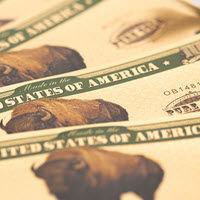Posted on November 03, 2022

What if there came a time when you hold paper money and it wasn’t paper? What if it actually had intrinsic value?
We know, right? A pipe dream, not gonna happen. Or will it?
Look, paper money gets a bad rep because of what central banks have done to it. They’re like IOUs from your unemployed alcoholic uncle who has a gambling problem – even though you absolutely love him, you know his promise to pay is worth less than the paper it’s written on (sorry, Uncle Dale!).
The problem with fiat currencies isn’t the currency part, it’s the fiat part. Fiat means “an arbitrary order or decree,” and in the case of currencies, it means it’s worth something because the government says so. There’s no intrinsic value – just the hope that somebody somewhere will be willing to accept it.
In the olden days, we used gold and silver coins to pay the bills. Gold and silver coins have intrinsic value. But they’re also rather heavy and cumbersome compared to paper money.
Now, imagine a new form of money that combines the convenience of paper with the intrinsic value of a gold coin.
Meet the gold note.
Never heard of a “gold note” have you? Not your fault.
First of all, they were trendy around a century ago. Second, they aren't that widely available or mentioned.
The gold notes or gold certificates that used to circulate, until the Federal Reserve canceled gold (so to speak) in 1934 were paper money that you could trade in for gold. Silver versions went away in the 1960s. Sometimes the terms “gold note” and “silver note” are used for these old, no-longer-redeemable-for-precious-metal-but-still-legally-money paper dollars.
That’s not what I’m talking about.
Modern gold notes are way more awesome than the older ones. But did you know that the old ones still fetch a high price among collectors? A $20 gold certificate that's just shy of 90 years old in good condition goes for $200-$300, and that's just for the circulated versions. And despite the Fed not wanting anything to do with them for most of a century.
What, then, can we expect of gold notes I’m about to describe?
Spoiler alert: I expect great things…
Like it or not, gold bullion manufacturing is a high-tech industry. For as much as we like to talk about gold in an "old value" sense, the gold industry of today is all modern mints with state-of-the-art anti-counterfeiting laser engravings and so on. As technology advances, the tools available to counterfeiters advance as well. Secure money has to change over time.
The gold notes manufactured by Valaurum aren’t just beautiful, they’re as secure as technology can make them. They call this gold note the Aurum.
Compared to the flimsy greenback the Bureau of Engraving and Printing cranks out by the truckload, Valaurum’s gold notes are just plain classy. Look at one! It exudes value.
The company itself makes no attempt to hide how advanced their manufacturing process is, with its multiple international patents and proprietary trade secrets. The result is a delightful, paper-thin real gold note with an intrinsic weight of gold ranging from 1/1000th troy oz up to 1 gram.
Yeah, that’s not much gold – but try cramming more than 1 gram of metal into this format and you either end up with a movie-poster-sized bill that’ll never fit in anyone’s wallet, or a very pretty gold bar which would hurt to sit on.
We're going to be adding two Aurum gold notes, the Liberty and the Freedom 1/10th gram notes soon (both due to demand and because we absolutely love the idea).
Remind you of something you’ve already seen and read about here at BullionMax?
Utah is all about sound money, so it's no surprise that there is also a gold note coming out of that state in the form of the Goldback. More specifically, it's four states and five denominations.
We've covered Goldbacks in some lengths here, so we won't go too in depth now. But it bears mentioning that this is far from a fringe idea. People want paper money that is guaranteed not to become trash, and it's not exactly a surprise that gold is being used to facilitate this.
The Goldback is slightly less in-your-face with design and features, and instead sports more of a classic "Wild West" feel to it. And they’re all in our inventory (most of the time), so if you want to buy Goldbacks, our prices are the best.
Silverbacks are a slightly more curious case. Because of silver's comparatively lower value, a 1/1000th of an ounce silverback probably won't go into circulation. But only 100,000 have been minted, and right now, you can get one for under $10. Once these collectibles start selling out, do we really expect the price to stay that low?
Intrinsically valuable money that’s as easy and convenient to use as cash? Once people know what gold notes are, can you imagine they’d turn them down? I can imagine signs at the farmer’s market, at the gunsmith’s shop and at my local bakery that say:
Pay with Goldbacks or other gold notes!
(Cash, credit cards grudgingly accepted)
Whatever happens to the company, a one-gram Valaurum gold note will still be worth at least one gram of gold as it is today.
In truth, though, it's probably going to cost more. In good condition.